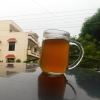The train was scheduled to depart at 5 pm from the Old Delhi Railway Station. It was going to be a 24-hour-long journey. I was meeting Ash directly on the train. Together we were travelling to Muzzafarpur in Bihar for an official tour. None of us had visited that district before. Our stay had been arranged at the house of Kavita - a fieldworker at a local NGO. For three weeks we would be staying in her home and conduct interviews in the villages.
I boarded the Delhi metro to reach the Old Delhi Railway Station. I had a small backpack and a handbag containing my wallet with me. I was changing the metro line to the yellow one at the Rajeev Chowk station when the woman behind me began to push me. She was sticking very close to me. I looked back at her and snapped, “Can you please stop pushing?” After reaching the railway station I boarded the train to Bihar. Ash had also reached and was on the top berth opposite mine. Just as I settled on my berth, I scanned my handbag for my wallet. It was gone! Panic gripped me as I realised it was missing. I racked my brains as to where I could have left it and suddenly I realised that it was at the Rajeev Chowk Station, the woman who was pushing me from behind had picked it. It was an unpleasant feeling since I had lost my favourite wallet with some cash with it. Luckily my ATM card and some more cash kept in the inner pocket of my handbag had survived the theft. I was, however, feeling quite miserable. Ash too was irritated since he had not yet recovered from a severe flu and was feeling sick.
A catering guy boarded the train and asked us if we needed food. Ash had not had his lunch so he asked for a vegetarian meal. He finished his meal and lay down to rest. His head was stuffed from the flu. He found solace in sleep. But all peace evaded me since I kept thinking of my lost wallet. To distract my mind I started playing angry birds on my cell phone. The sound of cackling angry birds filled the air. After some time Ash pulled his curtain aside and called out to me, “Can you please stop making those noises, they are freaking me out!”
“Oh sorry!” I said, “I’ll stop playing now”.
I put my cell phone aside and tried hard to sleep. But my mind was too turbulent for any sleep. When we woke up in the morning the train was significantly empty and both of us moved to lower berths. Ash was in a stupor due to the fever and continued sleeping. He did not even got up to have tea or breakfast. By the afternoon, the train was crossing east Uttar Pradesh and was going to enter into Bihar. Most people had de-boarded and there were no catering services available. I got a bit worried since Ash had not eaten anything since the morning. The train halted at a small station and I de-boarded to get some tea. I got tea and bhujiya packets for both of us. Ash was still in a daze and refused to have the tea. I almost forced it down his throat and he went off to sleep again. It was late evening when our train halted at the Muzzafarpur station.
I received a phone call from Kavita’s husband, Deepak, that he was waiting at the platform to receive us. At the platform we were greeted by a dark, lean, bald man in his early fifties. He was chewing paan. The village was fifteen kilometres away from the city. We hired a big auto-rickshaw for Rs 200/- that took us to their house. It was pitch dark on the road as we left the city and entered the countryside. When we reached their house it was engulfed in darkness except for the places where the lanterns were burning. It was a joint family living in a typical rural house with a huge central courtyard surrounded by rooms on all sides. Everyone was in the courtyard since the rooms were too dark. We greeted everybody and were taken to a room to keep our bags. Kavita was a short, dark and slim woman with a husky voice and a confident and affectionate demeanour. She asked us to wash ourselves and have dinner. I took a candle in my hand and went to the bathroom hoping that there were no insects or crawling creatures on the floor waiting to greet me. Soon after dinner we retired to bed since we were quite tired.
It was only the next morning when we woke up that we could see the family members’ faces clearly and understand who was who. The patriarch of the family, a widower was over 80 years old. Popularly known as Masterji, he had retired as an English teacher from the government school. He had three sons and two daughters. His eldest son had followed his footsteps and also worked as a teacher in a government school. His wife was a tall and fair woman with sharp features and glowing skin. She was the matriarch of the family and both Kavita and her younger sister-in-law would cover their heads and lower their eyes when she spoke to them. The matriarch had no children of her own but had adopted Kavita’s son, who was now 26. The children of the household called her “Badi Mummy”.
Kavita’s daughter Nishu was 22. She took tuitions at home every morning. She had finished her graduation and wanted to enrol for a post-graduate course. But her family was keener on getting her married and were looking for a suitable groom. Kavita was a dedicated fieldworker. She was dynamic and active unlike her husband Deepak who was currently unemployed and had been so for a long time now. Their family owned agricultural land in the village but Deepak was least interested in farming so he idled his time doing petty chores for the household. His younger brother tended to the fields and took care of the labour and the crop. The vegetables and rice for their household would come from their own fields. But Kavita was anxious.
She would always wish that her husband found work so that they could live with dignity. Although no one said anything explicitly to Deepak, there were always undercurrents of disrespect in the way the members of the family treated him. Her son was in Patna, working in a company but he could hardly save enough to send it back to the family. Moreover her son was not her own now. She had given him to “badi mummy” who fussed over him when he visited over the weekend.
Kavita was the protective shield of her husband. She would save him most of the times from his family’s ire by doing extra work herself. Every morning before she left for work she would make tea and meals for the entire household of ten people. In the central courtyard in a corner was a chulha made of clay where she would burn firewood every morning and cook daal, two vegetable curries, rice and chappatis for the entire family. Massive smoke emanated from the chulha but Kavita said this is how they had cooked in the village for ages. She had been doing the same for 30 years of her married life and felt that it had affected her eyesight as she found it difficult to read now.
Badi Mummy hardly cooked. She would only cook something special for her husband or her beloved adopted son when he came home on the weekend. One day her husband was detected with diabetes. We witnessed the fuss created by his devoted wife. She was restless the whole day and kept shouting at Kavita and the youngest daughter-in-law of the family.
“How many times I warned the two of you to keep the oil and spices limited? Now see the result my husband got diabetes”. Saying so she burst into tears.
In another spell of anger she said, “From today I will cook the curries for my husband – none of you will cook for him”.
Kavita and her sister-in-law endured the anger with their heads lowered. For Ash and me this was a unique experience since both of us were raised in nuclear families in cities. It was amazing how despite having different temperaments the family clung together to put up a united face in the village. At night there would be no electricity and all of them would huddle together near the hearth and chat for hours before they retired to bed. Nikhil the youngest boy in the household would do his homework by the lantern. Ash and I would sometimes help the kids with their homework.
Soon we became a part of the household. Every morning Kavita gave us our tea at 8 am and breakfast consisting of curries, rice and chappatis at 9 am. She would feed us well often asking us to have more food. She especially force-fed Ash since she found him to be too lean. It was fascinating for me to watch how she fussed over Ash’s food and loved him like her own son. We would then leave for the field, spending our day interacting with people in the villages. The long dusty paths that led to these villages were beautiful and we loved walking on them. Flanked by agricultural fields on both sides, Kavita pointed to us the variety of crops including maize and tobacco.
Sometimes when she had work in her office in the city, she would let other fieldworkers take us around. She took a shared auto at the highway leading to her office. The countryside was beautiful except the stark poverty and the deep-rooted caste system that we were witnessing in the villages. The government schemes were dysfunctional due to corruption and manipulation by the village elite. Nothing was working for the poor.
Drinking water was pumped out from the ground through a champakal or a hand-pump. On the first day of our field visit Ash and I filled our bottles with the water from the champakal. After some time the water turned yellow! “Ewww! That looks like cow urine,” Ash said, and both of us were scared to drink that water. We thought of bringing a water filter for the family and went to the city to pick it up.
Since there was no internet connection in the village we decided to also check our mails at the internet café. In the evening we returned to the village. As we got off the rickshaw there was excitement regarding the water filter and everybody got busy examining it. Ash was on his Blackberry phone. His web data signal was sporadic.
Suddenly he screamed, “Oh my God!” All of us were gathered near the fireplace and looked at him surprised. “Somebody hacked into my email ID!” he cried! “The hacker is sending obscene messages to my female friends”.
I burst out laughing. It was a funny situation but most people in the family could not understand what the hue and cry was about. Ash was distraught and I was giggling away. I was sure that somebody had signed into Ash’s email at the internet café. Ash said that he would not accompany me to the village the next morning but would go to the city to the internet café to protect his email id from being further misused.
It was a hot morning the next day and I decided to wait at home till Ash returned to head to the village for work. Since the men were all out of the house, the women of the house including Kavita and her younger sister-in-law were bathing in the open in the courtyard near the champakaal. Dressed in a petticoat which covered their upper and middle body, they giggled away as they bathed. I was sitting in the room with my book trying to read as their laughter trickled into my ears. Suddenly Ash entered the room. His face was flushed.
“What’s with the women in this family?” he asked me with a quizzical look.
“What is with them?” I asked.
“Why are they all bathing in the open? I think I saw more than I should have” he retorted.
It was another giggly moment for me. After last night’s email saga, this incident was too hilarious.
“Relax! You just stay in the room till they finish,” I said.
“Ya ya,” he said frustrated.
Later when I saw Kavita, I said, “Kavita Ji! You shouldn’t bathe like this in the open. What if the men walk in? You know Ash was disturbed because he saw you bathing.”
She laughed in her usual light-hearted style and with her husky voice she said, “Ash’s like my baby, so what if he saw me.”
Later I told this to Ash jokingly. He got even more worked-up and said “What does she mean by I am like her baby? It was embarrassing you know.”
In three weeks’ time Kavita and Ash had developed a strong mother-son bond. She loved cooking his favourite vegetables and see him relish them. Kavita’s family felt like our own now and it was hard to say goodbye to them.
Soon it was time to leave. The family bid goodbye to us as we boarded another big auto for the railway station. Kavita had made sattu parathas for us to eat during the journey. We promised to be in touch over the phone and departed.
I continued to call Kavita once every few months from Delhi. Two and a half years had passed since our epic journey to Muzzafarpur and the memorable time we spent Kavita and her family. Nishu was now married and was expecting a baby. Kavita’s son was married too and she seemed to be content when I last spoke to her. One afternoon as I was finishing up a task at my office, my phone rang. It was a call from the head of the local NGO in Muzzafarpur where Kavita was working. I was a bit surprised as I said “Hello”. The voice from the other side sounded morose.
“I have called to give you the sad news that Kavita has passed away in an accident on the highway yesterday and we are taking her mortal remains for cremation in a few hours from now,” he said.
I was too stunned to react and just said “how can this be? Thanks for informing me”. He hung up the phone. My mind was numb and I looked at Ash. I could only mumble “Kavita!” Her husky voice and light-hearted laughter echoed in my ears.






Comments